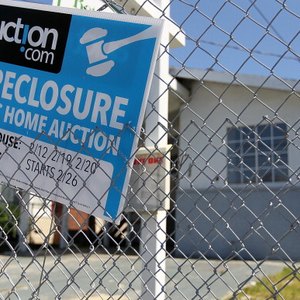
Private mortgage insurance (PMI) is insurance that protects a mortgage lender in case a homeowner defaults on his loan. Lenders typically require PMI when home buyers borrow more than 80 percent of the purchase price of their new house. Though private mortgage insurance acts as protection for a lender if the homeowner forecloses, it also provides a way for home buyers to purchase a house with little money down.
Foreclosure
Once a mortgage lender forecloses on a homeowner’s property, the home goes to auction to find a buyer. If the lender does not sell the home at a price high enough to pay off the balance of the previous homeowner’s loan, the bank loses money in the foreclosure process. The deficit qualifies for a claim against the previous borrower’s private mortgage insurance, which will pay the bank for the sum of the deficit up to the amount the home was originally insured for.
Who Needs PMI?
Lenders decide whether they require a home buyer to purchase private mortgage insurance for conventional loans, but government-backed FHA loans always require buyers to purchase PMI when they pay less than a 20-percent down payment on a home purchase. The buyer is responsible for paying the monthly premiums, which are usually rolled into a mortgage escrow account. However, homeowners who itemized their federal tax deductions can deduct 100 percent of the cost of mortgage insurance premiums each year.
Cancelling PMI
A homeowner with a traditional home loan that is not backed by the federal government has protections in the Homeowners Protection Act of 1998 that prevent home buyers from paying unnecessary private mortgage insurance. So long as the homeowner is current on his mortgage payments and originated the home loan on or after July 29, 1999, he can cancel his PMI through his lender once he reaches 20 percent equity in his home. Once he reaches 22 percent equity in his home, the lender must automatically cancel PMI if he has not already done so. Unfortunately, homeowners with FHA or VA government-backed loans do not have these protections and may have to pay private mortgage insurance for the life of their loans.
Avoiding Foreclosure
According to the United States Department of Housing and Urban Development (HUD), homeowners facing the possibility of foreclosure on a property or residence due to unaffordable mortgage payments should immediately contact their lenders. Mortgage lenders have programs available to help homeowners catch up on past-due mortgage payments, and some homeowners qualify for loan modifications that change the original terms of a mortgage and lower monthly payments.
References
- Federal Trade Commission: Cancellation of Private Mortgage Insurance -- Federal Law May Save You Hundreds of Dollars Each Year
- HUD: Contact Your Lender to Avoid Foreclosure
- HUD: The Federal Housing Administration (FHA)
- Federal Reserve Bank of Boston. "Discrimination, Redlining, and Private Mortgage Insurance." Accessed September 12, 2020.
Writer Bio
Allison Westbrook is an experienced writer of three years with a passion for creating relevant articles for a wide readership. She attended Kilgore College and majored in English. Allison's articles have appeared on such websites as eHow and Trails.com. Her reflective writing angles deliver focused and consistent content.

